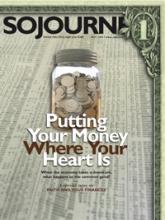The economy, as you may remember from last month, is still in need of discussion, particularly in light of this special issue on personal finance and investing. For those unfamiliar with the term, “investing” essentially means saving money to buy things in the future that cost a lot less right now. (Both gasoline and milk, for example, are rising almost daily in price, leading one to the obvious solution of stockpiling them in the basement for a couple years—but not too close to the furnace, because the gas could go bad.)
Prudent financial planning has become a necessity since your parents are, at this very moment, blowing your well-unearned inheritance on frivolous things like food, medicine, and payments to Nigerian citizens who, because of their proud tradition of generosity, promise to return the money with interest just as soon as they receive your parents’ bank account number.
With the economy in apparent free-fall, investing wisely can be a challenging proposition. Fortunately, the age-old maxim of starting early still applies, as the following data show:
• If you are in the 25-to-35 age bracket, and set aside 5 percent of pre-tax income in stocks and bonds, your investments will grow—even if current economic conditions prevail—permitting you to retire comfortably by the age of 83.
• If you are in the 36-to-50 age group, you’re behind already. You should move into your neighbor’s garage to save on rent and invest half of your salary in stocks of strong growth industries, such as prison construction. This will permit you to retire at 92, though you’ll still have to work weekends. As a prison guard, perhaps.
Read the Full Article
